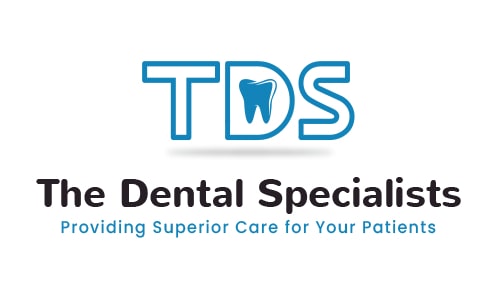Everything You Need to Know About Black Tartar on Teeth
Have you felt embarrassed with dingy black substance peeping out from your smile? What exactly is it and how is it caused? Let’s find out more about it with the information shared by the best dental cleaning experts in Chicago at The Dental Specialists.
Tartar (or dental calculus) is a hardened/ calcified form of dental plaque or biofilm that coats teeth, around the gums, or on the tongue surface and contains bacteria. It is an unwelcomed substance in the oral cavity, thereby resulting in a stained smile. It primarily appears yellow but over time changes into green, brown, grey, or black. When it occurs at the base of the tooth, below the gum line, it is often black. Dental tartar is stubborn and cannot go away with regular brushing and flossing instead it requires professional assistance. Black tartar is very harmful as it can be a breeding place for bacteria, making it difficult to follow an oral hygiene regime, and resulting in severe tooth decay and gum disease.
Thus, black tartar is not only an oral health issue but it does ruin facial aesthetics. Therefore, one must regularly perform a self-examination of the mouth, practice a proper oral care regime, and visit the dentist in Chicago at The Dental Specialists without any delay in case of tartar build-up and to achieve an improved oral health.

What causes Black Tartar on Teeth?
Tartar appears only from the calcification of dental plaque build-up when the minerals from saliva deposit in the plaque. Usually, poor dental hygiene care is blamed for causing black tartar. A proper oral hygiene routine can help get rid of colorless, soft coating on the teeth surface called dental plaque but if it is not done right or plaque is left untreated for long periods, it leads to tartar formation.
Tartar may initially appear as off-white or yellow but gradually turn black in a few circumstances. The reasons for black tartar formation include:
External Factors (coming from outside of teeth):
- Dental fillings and crowns are composed of silver sulfide, an amalgam that can make the teeth appear black.
- Intake of teeth-staining beverages like black tea, red wine, black coffee, dark fruit juice, soda, etc., or a diet loaded with sugars and starch. These can cause any tartar clinging on the teeth or along the gum line to take on a darker hue.
- Smoking cigarettes- If tartar is already present on the gum line, it can quickly turn black with three components present in a cigarette- tar, nicotine, and carbon monoxide.
Internal Factors (the damage starting from inside and progressing outwards):
- Damage or breakdown of the teeth enamel, an outermost protective covering of the teeth. The damage can result in the appearance of black tartar look on the teeth.
- Tartar that grows along the gums at the baseline of teeth is mostly black and called sub-gingival tartar. It is formed when the blood from diseased/sensitive gums combines with the tartar. This also indicates the advanced stage of gum disease.
Symptoms/Signs of Black Tartar on Teeth
Tartar on teeth never comes alone rather it is accompanied by various other symptoms. For people who wish to confirm the presence of tartar on their teeth, don’t look further. Here are some tell-tale signs that indicate the formation of black tartar on teeth:
- Loose fragile tooth
- Inflamed, red-colored, bleeding gums
- Bad-smelling breath- medically termed halitosis
- Dark-colored staining on the teeth’ surface
- Calcified, hard deposits on the tooth.

How to Remove Black Tartar on Teeth?
There is only one way to get rid of black tartar on teeth- undergoing deep professional dental cleaning. This process usually includes scaling and root planing and may take two sittings to get over. The procedure is painless but if the patient needs it, a local anesthetic may be given to numb the area.
How can a Thorough Cleaning Eliminate Plaque?
Scaling and root planing are used to remove plaque from the tooth’s surface. A dentist uses specialized hand devices to access huge plaque- and tartar-infected spaces behind the gums. Typically, the operation requires at least two appointments, one for each side of the mouth. Plaque removal may require two hours per appointment, however, some situations may require additional time.
Tooth Scaling
In this procedure, the dental hygienist in Chicago at The Dental Specialist uses a handheld scraper or a vibrating ultrasonic device to scrape off the tartar from the tooth surface or below the gum line. These devices help to dislodge the tartar and then break them apart. Usually, scaling begins from beneath the gum line and then moves towards the middle and base area of the teeth crown. The scalar is positioned at an angle of 45 to 90 degrees from the tooth to effectively eliminate tartar. It is used in every possible direction including vertical, horizontal, and circular to ensure thorough cleaning.
Root Planing
If there is cementum- a film a layer covering the tooth roots, then root planing is done. In this procedure, the dentist goes deep down and accesses the roots for cleaning and removal of deep-seated tartar. It helps achieve smooth surfaces and the elimination of subgingival bacteria.
In the weeks that follow scaling and root planing, teeth and gums will exhibit symptoms of healing and recovery. Keeping the mouth healthy may need more appointments, but patients should be encouraged to return after achieving positive results. Frequent brushing and flossing can aid healing and maintain good dental health. Plaque-free teeth today can lead to a better smile and bite tomorrow.
Tips to Prevent Growth of Black Tartar on Teeth
- Daily brush teeth twice at least for 2 minutes in a gentle, circular manner with a soft, bristled toothbrush, and do flossing at least once after the meal.
- Daily rinse mouth with a mouthwash to steer clear of any remaining mouth bacteria and foul-smelling breath.
- Use fluoride-based toothpaste to allow re-mineralization of the weak or damaged tooth enamel.
- Try to avoid excess intake of food or drinks that are rich in sugar and acid content.
If one is neglecting their oral dental health, they are at most risk of developing black dental tartar.
Consult the dental experts in Chicago at The Dental Specialists to achieve improved oral health and effective treatments to remove the dental plaques and tartar following the professional teeth cleaning services.

